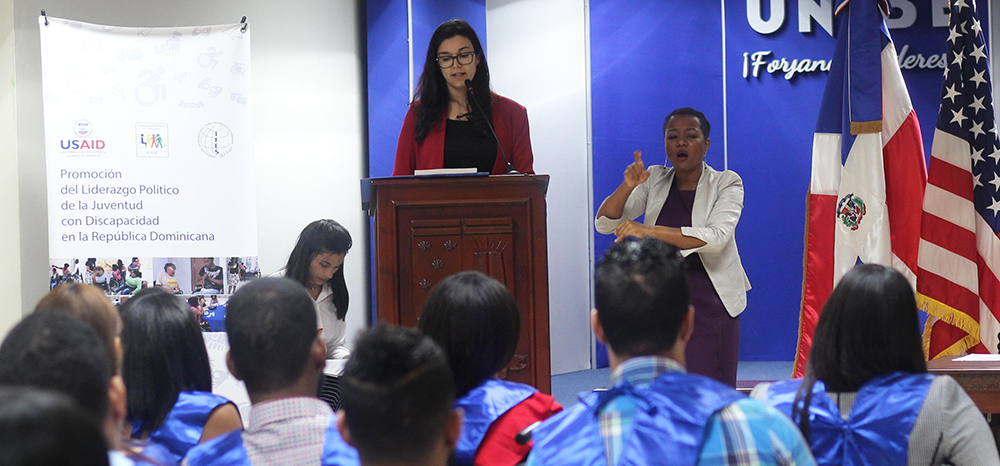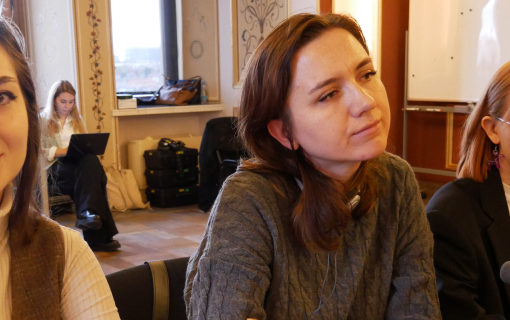
Women of IFES: Q&A with Fernanda Buril
by Marit Björnlund*
The International Foundation for Electoral Systems (IFES) is at the forefront of innovative and inclusive work to provide citizens around the world with the fundamental human right to have a say in how they are governed. IFES’ leadership in the field is comprised of a cadre of women professionals with firsthand experience administering elections in every region of the world. This Q&A is part of the “Women of IFES” series, featuring stories throughout the month of March on the contributions of female IFES staff around the world and marking both Women’s History Month in the United States and International Women's Day on March 8.
Here, IFES Program Officer for the Americas and Electoral Operations Technical Coordinator Dr. Fernanda Buril discusses integrating her academic background into programmatic work at IFES, authoritarianism and disinformation as major challenges to democracy, and how she has learned the importance of the “nuts and bolts” of electoral processes in her work to strengthen them.
Buril holds a Ph.D. in political science with a focus on political psychology and international relations from Washington State University. She is a native of Brazil and fluent in English, Spanish, Portuguese and French.
What drew you to IFES and the field of democracy, rights and governance, especially right after completing your Ph.D.?
One of the motivations that has constantly driven both my academic and professional choices was contributing to reducing conflict and finding ways to enhance human cooperation for the benefit of society. I came to the not-so-surprising realization, however, that we cannot expect healthy and positively peaceful dynamics in places where certain individuals usurp political power, create or deepen opportunity gaps among citizens, and deprive them of having a say in how their country should move forward.
When I learned about IFES’ work, I saw a great opportunity to address these issues by strengthening democratic institutions and principles and increasing people’s meaningful political participation in collaboration with electoral officials and civil society. This collaborative work is crucial to me because it guarantees local ownership of activities and the sustainability of the progress made toward democratic consolidation. When we use our independent expertise to strengthen institutions, I believe we prevent dependency and contribute to the emancipation of these institutions.
In IFES, I found a place where I could keep working toward a more peaceful and just world in a more practical way, helping design and implement projects that empower citizens and improve governance so people can have access to more systematic, effective paths to address grievances and effect political changes.
How do you see academics and development practitioners working together to promote inclusive democracy?
We are living a defining moment for the future of democracy and that, if we want to protect this system of government and its principles, we cannot afford to have academics and practitioners not communicating with each other. The new waves of authoritarianism and the explosion of disinformation campaigns seeking to legitimize nondemocratic systems and undermine basic democratic structures around the world show that democracy did not have the happily-ever-after chapter Fukuyama wrote for it. We need, for example, interdisciplinary research to understand the effect of these campaigns on our cognition and how to strengthen our defenses against false information. We also need research on the dynamics of political engagement and violence, ways of promoting the participation of marginalized groups and the most effective mechanisms to regulate political financing. All this research cannot be done in a vacuum and its findings cannot be limited to a few readers. What we do in the field must be guided by consistent evidence so we can expect optimal results, and these results must be rigorously monitored and evaluated to guide new research and develop improved methods of action. Close communication and collaboration between academics and practitioners, to me, is what can prevent us from repeating failed practices or wasting resources.
How does your work at IFES promote women’s empowerment and inclusive governance?
When IFES works to strengthen democracy, we’re working to promote all citizens’ access to political participation. We keep in mind that it is not enough to have cutting-edge electoral technology or a robust election management body when women, who represent at least half of the country’s population, are marginalized from electoral processes. The lack of – or weak – participation of women in these processes, both as voters and as candidates, is usually due to non-physical barriers such as gender role stereotypes, financial and connections gaps that make women less viable candidates in certain places, and even women’s lack of confidence in their potential to assume political roles.
Taking this big picture into consideration, we work on different fronts to reduce the gender gap in decision-making. For instance, while we work directly with electoral officials building the capacity of personnel to create more inclusive civic education campaigns, we also work with civil society organizations to enhance women’s leadership skills. We do our best to mainstream gender-sensitive activities into all our programming and we count on an excellent team of gender inclusion experts to support our efforts and help us find innovative ways to empower women and girls around the world.
What have you learned in taking on your role as electoral operations technical coordinator, in addition to your role on the Americas programs?
The technical side of elections was completely new to me – all the planning and training that need to happen before Election Day, the logistics that needs to be in place for election materials to arrive to polling stations on time, the different ways citizens can cast their ballots, count votes and manage results… These nuts and bolts of electoral processes, although not often discussed, account for much of an election’s success, and I felt that I needed to understand them better to provide the support the institutions need to thrive.
I have had the opportunity recently to speak with members of election management bodies in Latin America and I noticed that, although there was certainly interest in reforms and innovations, there were always important concerns about technical and operational issues that are frequently overlooked by those with no experience administering elections in challenging environments. They were concerned, for example, about how they would afford the equipment in the longer term, how to set up polling stations in remote rural areas or how to prevent a new results transmission system from failing for lack of trained personnel.
Combining the roles of technical coordinator and program officer has helped me build the bridge between understanding what our partners need and how to fulfill these needs. I have been able to access our institutional expertise and experience in this area more easily and build upon the lessons learned from programmatic developments in other regions to improve new projects.
What advice do you have for other women working in the field of democracy, human rights and governance?
For those already working in the field and for those who are considering it: I believe it's never too early or too late to learn new things, break into new territories and reshape the way things are done. We know the field of democracy, human rights and governance has room to grow and improve, especially concerning women's representation, and the most effective way of addressing this weakness is by changing the field from within. This is not just about filling quotas – it's about having the opportunity to participate in governance at every step, voice women's specific needs and concerns, give opinions that speak to our different experiences and present solutions we developed by having different perspectives. We’ve come a long way, but we are always in need of bright, motivated women to keep shattering glass ceilings and building ladders for the next generations.
*Marit Björnlund is a program associate for the Americas at IFES.











